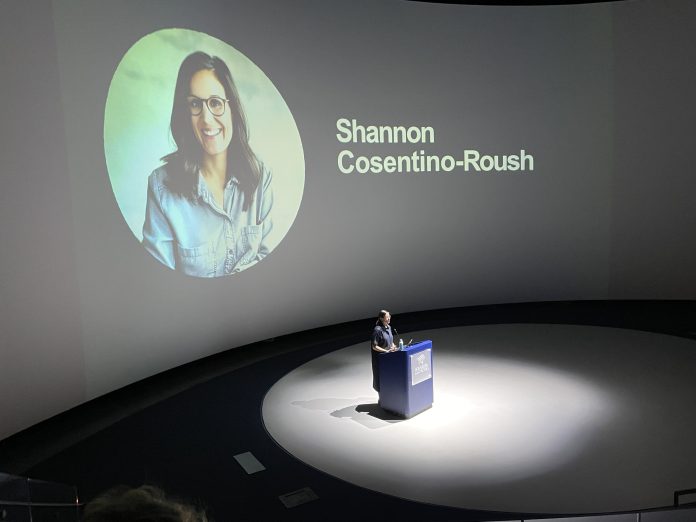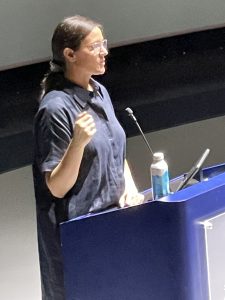
Not since the blockbuster “20,000 Leagues Under the Sea” has so much attention been directed toward the world’s oceans and what they deliver to society.
And, according to sustainable ocean expert Dr. Shannon Cosentino-Roush, governments around the world are beginning to re-examine the ocean economy as they struggle to create real-world policies to reflect this new understanding.
The demand and consumption of aquatic (blue) foods is at an all-time high, up 483% since 1961, and only projected to increase.
Simultaneously, our global ocean faces a dual climate and biodiversity crisis, standing to further affect its productivity and the number of people relying on aquatic foods for nutrition, food security, and employment, said Cosentino-Roush.
“It’s unquestionable that we stand at a critical juncture faced with the task of figuring out how to balance global food security, livelihoods, and the sustainable management and health of our ocean,” she said in a pre-event statement.
On Aug. 7, Cosentino-Roush spoke to a large crowd at the Aquarium of the Pacific’s Honda Vision Center for the August First Wednesday lecture.
“I think we’ve not explored the ocean-based economy because it’s been traditionally very few industries like shipping and fisheries, commercial fisheries, and they’re quite niche,” the industry expert told ENE in an interview before the lecture.
“I mean, shipping is a huge industry, but, you know, I don’t think folks give it much thought, but to be able to get more financing into the ocean so that it’s not purely just philanthropic,” she said.
“We need to think about what an ocean-based economy is, and how do we do so in a way that still prioritizes sustainability, not just extraction, and how do we think through what that means,” said Cosentino-Roush.
As an example, Cosentino-Roush explained during the lecture that, for the first time ever, seafood produced by aquaculture has surpassed wild-caught seafood this year as various technologies and farming methods are quickly developing.
Business requires a return on investment,” she said, “and so if we don’t explore what that means, then we’ll have a hard time getting more financing into the ocean.”
“There’s a lot of excitement right now, obviously, with the excitement comes controversy around the energy-based economy for the ocean, not just offshore wind, but what about wave energy and things like that,” said Cosentino-Roush.
She said the U.S. Department of Energy is doing a lot of interesting exploration around ocean-based technologies and that there is a lot of “conversation” around how we, as a society, value what oceans do for us and how to value “natural capital.”
Also, she said, there is much interest in how to value a coral reef for insurance-based protection.

Shannon Cosentino-Roush is working to develop sustainable policies for the emerging ocean economy.
For instance, “it’s not just the value of the coral reef for esthetics, but instead of insurance companies having to figure out how to build an environment to block wave action, how can we create financial mechanisms where we value the things that already exist for the jobs they already do,” she said.
Such natural valuations are necessary, she said, to attract new investments into the ocean economy.
“We need to channel some funding into those areas versus philanthropic or government funding simply trying to protect a coral reef for its esthetic value,” the speaker said.
In addition, as experts work to refine public policies to adapt to this burgeoning ocean economy, difficult decisions need to be made.
“There are also industries that are purporting to be sustainable, like deep-sea mining,” which was recently discussed at an international sea-bed conference asking “do we even need this industry for a green transition.”
Other topics, like carbon capture (carbon dioxide removal), are also hot topics in the world of global ocean regulators, said Cosentino-Roush, who, in addition to her advanced ocean degrees, has a law degree.

Courtesy photo
“Oceans are a majority of the planet and a majority of where our carbon is being sequestered,” she said, “and similar with industries around things like kelp,” she said.
“Are we doing enough with kelp farming and kelp-based input? So I think there’s, this is a conversation that is happening, and frankly, we’re probably just scratching the surface of it,” she added.
As awareness grows and new companies and technologies, the ocean economy could easily become the Wild West of the economic future, said Cosentino-Roush, who hopes to play a major role in the development of policy and regulations going forward.
The hard part of growing the ocean economy, as always, she suggested, will be attracting investment.
“The financing piece, I think, is the missing, but critical link.”
